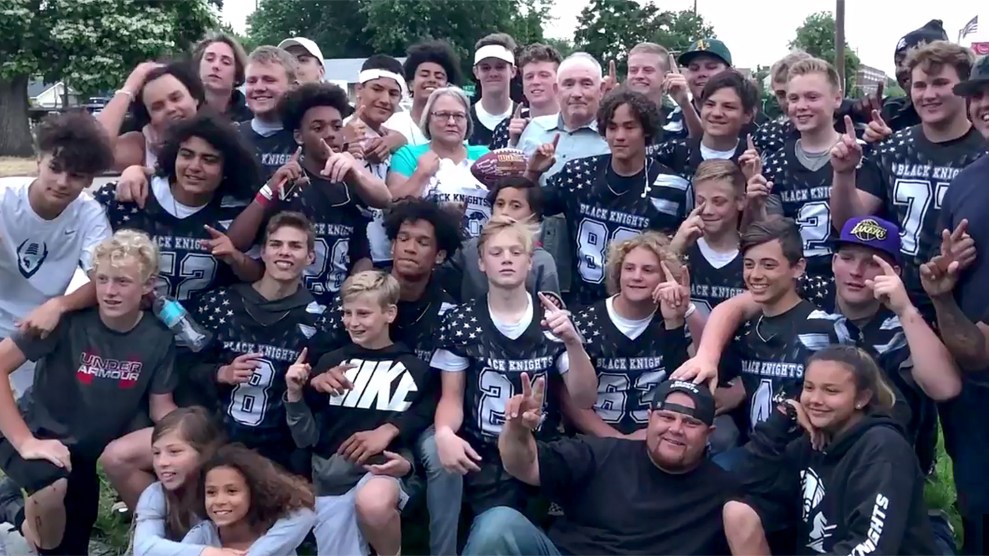
The Boise football players with the couple they rescued.Screenshot via the Idaho Daily Statesman
The 13- and 14-year-olds of an Idaho football team were jubilant on their way home through Oregon after winning a tournament in California.
Then they saw the overturned car and a couple stuck inside—and they got to work.
Alan Hardman said he was passed out from the crash when he thought he heard “young voices.” The teens got Hardman out, but his wife, Margaret, remained trapped. Six offensive linemen couldn’t push the car back over. But then 12 players from another van joined in to free her.
“I don’t know how we would have done it without them,” Alan Hardman tells the Idaho Statesman. “They didn’t even hesitate.”
Last Thursday, two days after the rescue, the Boise team visited the Hardmans, who were staying at a relative’s home in Idaho. They brought a signed football, flowers, cookies, and cards—and got hugs back in return.
Hi, David Beard here, and this week in Recharge, I’m highlighting some of the relentless and resilient young people who are striving for a better world. Recharge is a weekly newsletter full of stories that will energize your inner hellraiser. You can sign up at the bottom of the story.
- The odds were against them. They didn’t stop. It took some of these teenagers two years, but they finally got Utah’s solidly GOP legislature to talk about climate change—and to pass a resolution signed by the Republican governor acknowledging its effects. At first the Senate’s Natural Resources Committee wouldn’t even grant them a hearing. So the students organized an unofficial one—filling one of the biggest conference rooms in the state Capitol—and persuaded GOP state legislator Becky Edwards to sponsor a resolution in 2017. It failed, but dozens of teens came back this year with a bipartisan resolution focusing on factors that affect Utah residents every day, such as rising temperatures, varying snowfall, and worsening air quality. “I’m hoping that other conservative states, people, and students especially see that it is possible to work towards a healthy future and not lose hope,” says Mishka Banuri, a high school junior. (CNN)
- This photographer captured a man’s scariest moment. Also, his best. Last August, Marcus Martin risked his life to save a woman from a speeding car driven by a white supremacist in Charlottesville, Virginia. Photographer Ryan M. Kelly’s image of Martin being struck by the car soon became iconic and would go on to win this year’s Pulitzer Prize for breaking news photography. Nearly a year later, Martin and Kelly reunited, but under happier times—Martin was marrying the woman he saved, Marissa Blair. And Kelly was happy—even honored, he told me last week—to serve as their wedding photographer. (Slate)
- After this state banned pesticides, tourism and wildlife flourished. The tiny Indian state of Sikkim, high in the Himalayas, decided 15 years ago to ban all pesticides from its farms. It eventually outlawed pesticides and chemical fertilizers altogether, and phased out plastic utensils and dishes. Now Sikkim’s 600,000-some residents are setting a model for the world’s most populous democracy. The number of foreign tourists has increased significantly over the years, and in 2014, Sikkim was named the world’s top destination by Lonely Planet. The state’s production of large cardamom (think Earl Grey tea)—has increased by nearly 23 percent since 2014, and officials credit the resurgent bees that cross-pollinate the crop. Not all of the government’s efforts have been a complete success, however. The price of cabbage tripled, and some farmers say they need more access to organic manure, training, and markets where they can sell their food. But other countries are still paying attention: Sikkim’s Himalayan neighbor, the kingdom of Bhutan, is planning to go all-organic by 2020. (Washington Post)
- Away from Rwanda, and back—as a pacesetter. There are four neurosurgeons, all male, in Claire Karekezi’s once-riven homeland of Rwanda. Next month, Karekezi will join them as the first and only female neurosurgeon in the country. “I need to carry the dream to the end,” says Karekezi. As a 10-year-old who had to flee the genocide in 1994, Karekezi’s dream was to become a doctor. Though she endured the 100-day massacre—and lost relatives during it—it didn’t deter her. “I always tell people that that’s what sort of made us who we are today as Rwandese people,” she tells the Toronto Star. “Because we grew up knowing that we cannot count on anyone but ourselves. So this kind of spirit kept me going, to do whatever it takes to get where I want to go.” (Toronto Star)
That’s it for this edition! We hope these stories help you in the week ahead. Have a tip or a link? Email us at recharge@motherjones.com.

















